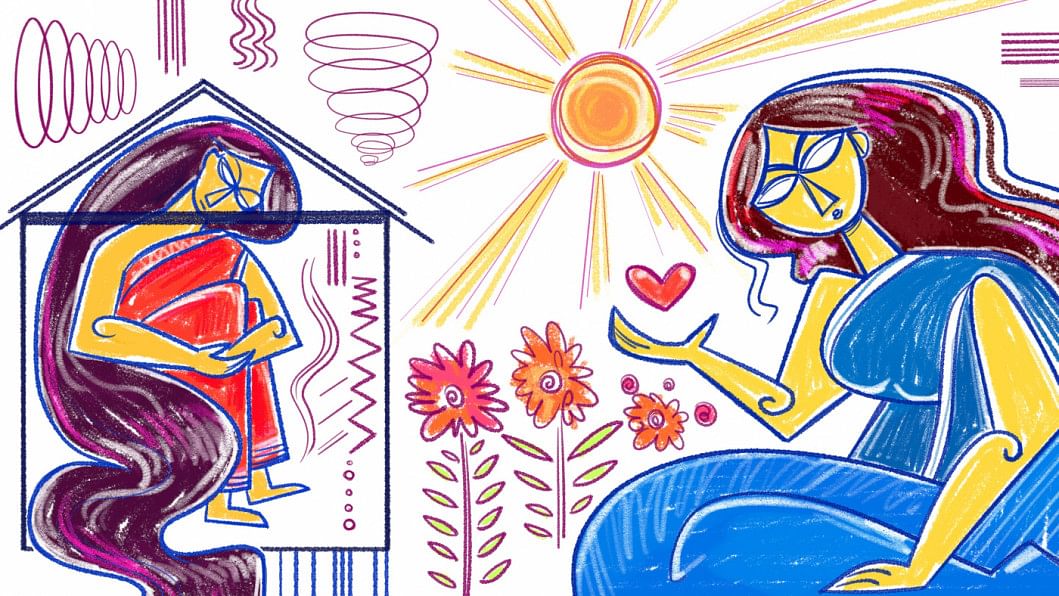The devaluation of the sacrificial mother

The image of the sacrificial mother has become a central tenet in our culture, and other cultures similar to ours. It pops up in speeches and advertisements, whether political or commercial, and places the mother on a pedestal so high, it runs the risk of a violent crash to the bottom at the slightest hint of not conforming to the ideal.
The ideal mother is often a housewife, her priority being her children, and it is usually children because a single child is often deigned as not enough. However, even as she is glorified, her work is devalued.
The relational category of mother, or more accurately the ideal one, is not just limited to children, it is closely attached to "wife" and "daughter-in-law". It is a frequent statement by husbands that their wives "do not work", and jokes shared by certain members of the older generation. She is grumpy, lazy, nonsensical, and ridiculous. These also reveal the stereotypical behaviour we expect women to have: to give without complaint and to give with a smile, for days on end without set time limits, until she is old enough to be replaced by a younger woman handling the responsibilities she had.
The responsibilities, of course, vary, especially so in the modern age. As women enter the workforce, many are experiencing what has been called the Second Shift, and the notion of "having it all" is ringing hollow to many struggling to find economic security while maintaining physical and mental health at breakneck workplaces. It ranges from doing extra housework after paid work even if the woman works the same hours as her husband, and it involves repeatedly making decisions for children as fathers take a backseat. It is what causes mental breakdowns in the present age, and what caused the mental breakdowns in mid-century America as noted by Betty Friedan while documenting the "problem which had no name" among groups of women who would be considered privileged even by today's standards.
Exacerbating the situation of so many mothers is the shame of having any negative feelings toward motherhood at all. It is what causes mothers with post-partum depression to suffer in silence, because it is so at odds with the dominant image of the unblemished happiness a mother has to feel.
An image making the rounds on the internet during the height of the pandemic included a Bangladeshi mother cooking while attached to oxygen support. It rightfully received criticism, with the criticism directed at both the individual who posted that image and the culture that encourages such behaviour. In a gender stratified society such as ours, the realm of the home is still the responsibility of the housewife, even as she suffers from a health condition where the physical action of breathing must be assisted.
The ideal mother is a reductive image, but the fervour with which it is defended frequently makes discussion impossible. This monolithic idea does not take into account the various situations under which mothers have to raise vulnerable humans for whom they are almost entirely responsible.
In the case of Bangladesh, as with many other countries, we also have to ask which mother we are speaking of. Often, it is the more privileged woman able to offload work to another woman who is either delaying her own motherhood or being away from her children, in some cases for months on end, because her poverty forces her to work in households not her own. For mothers who are disenfranchised to the extreme, there is no amount of herculean maternal instinct that will feed her children if she can't gather the money to pay for resources. There is no chance for her to save her children if they are stuck inside a factory making juice for more privileged children when a fire breaks out, or if a building is turned to rubble by some accident.
The ideal mother is therefore an image meant to console us. It indoctrinates us into taking a mother's love for granted even when we proclaim that we can never repay them for their sacrifices. Should a mother admit she prefers work outside rather than staying at home, the reactions are often negative.
The sacrificial mother image is what allows one to be aware of what women who are mothers aren't allowed to have or be: flawed, human, needing alone time, a purpose outside the family, disabled, destitute, sick. In increasingly atomised societies, there is a further risk of shame in asking for help. Flippant remarks can follow the sharing of a struggle with raising children, even as we continue to live in a society that pushes having children as the ultimate ideal, regardless of the kind of person an individual is.
In such circumstances, we need to ask who is served by the glorification of the sacrificial mother. The need for community support and social systems providing assistance for mothers, like paid maternity leave, reliable childcare, and well-designed cities with parks and other necessities for children's wellbeing, is essential. It's essential not only for the betterment of future generations, but also because not helping mothers makes days like Mother's Day a cheap holiday and mere lip service, existing more as an outlet for our guilt as we reap their labour, and pacifying mothers feeling the stirrings of revolt.
Aliza Rahman is a writer based in Dhaka. She can be reached at [email protected].
Views expressed in the article are the author's own.
Follow The Daily Star Opinion on Facebook for the latest opinions, commentaries and analyses by experts and professionals. To contribute your article or letter to The Daily Star Opinion, see our guidelines for submission.

 For all latest news, follow The Daily Star's Google News channel.
For all latest news, follow The Daily Star's Google News channel. 










Comments